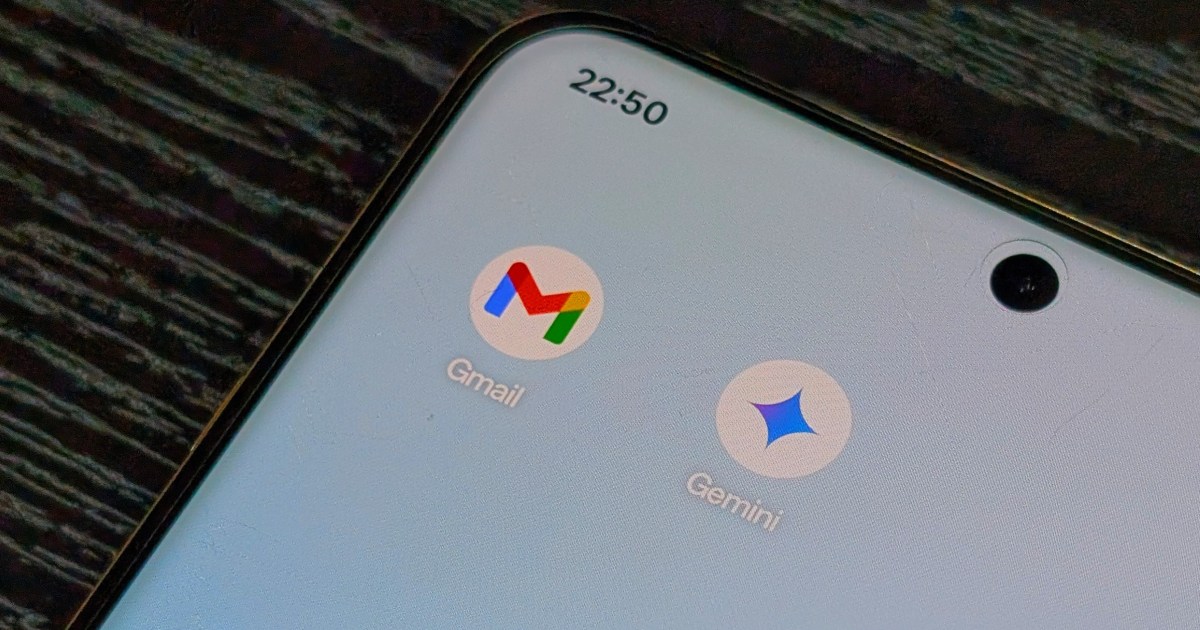Table of contents
Gemini is here. You just need a leap of faith
Is this justifiable?
The big picture
A few months ago, I randomly announced to my editor that some of our discussions on the Teams app were getting an AI boost. I wasn’t using AI tools to completely automate every aspect of my job. This would of course be unethical and a blatant abuse of the contract.
Instead, I used Apple Intelligence to straighten out my sentences, fix my typos, and tone down my em-dash bigotry. Twice I narrated my message, transcribed the audio with an AI tool, and used OpenAI’s GPT-4 magic to proofread the wall of text.
Typing the same message would have taken me at least twice, if not three times as long on the phone. If a phone wasn’t within reach, I would have had to stop on a platform and type the answer into my laptop, perched on the cold metal seat of a busy station.
Starting today, AI is now a permanent part of my inbox, and in a way that feels more “human.” Before I said “yes” to integrating Gemini into my inbox, I wondered intensely whether AI should even exist in a place as intimate as Gmail.
Gemini is here. You just need a leap of faith
“Tell Tyler the idea is cool, but I’m not talking about advances in drug discovery. Tell him to keep sending pitches though. Wish him luck.
It was my last invitation to a communications manager from a reputable scientific institution, who sent me a press release about a drug that can start working on migraines almost instantly.
The Gemini-generated email was an elaborate response that expressed my excitement for the discovery while also expressing my inability to write on a topic that falls outside my area of expertise and the publications’ coverage area. I felt better after hitting the send button.
Everything happens in a few seconds.
Before using Gemini’s compose feature in Gmail, I rarely wrote emails to reject a pitch, even if I wanted to extend the courtesy of a response and hoped to preserve long-term contact with the sender .
Usually I try to keep answers as informal as possible, but if I change my mind, Gemini offers a one-click route to formalizing the words. The “Elaborate” and “Shorten” quick actions are also useful.
I often add a phrase like “keep it light” to squeeze in a few words that are worth laughing about. The jokes are predictably bad, but they mostly hit the contextual bullseye.
Otherwise, I’m always ready with backtracking, the lifeline for anyone who writes for a living. It never hurts to take matters into your own hands. With generative AI workflows, this is more of a necessity than an optional precaution.
Yes, AI concocts facts. With Gmail, this is limited to the email context.
Another reason I love Gemini is the time it saves me. Being part of a newsroom means things are a little too dynamic. Honestly, it’s a pretty strange place to be since AI has had a visibly detrimental impact on the media industry.
The rush to cover the latest happenings often resulted in emails being ignored, either due to time constraints or simply because I no longer had the energy to deal with inbox tasks after filing consecutive articles. This is where Gemini comes to the rescue.
Now, I’m not a fan of email summaries, but they help me decide if I should dig deeper into the actual content. Once I open an email and choose to reply, Gboard’s dictation feature and Gemini’s Smart Compose take over.
The entire pipeline is noticeably faster, and ultimately that’s what matters, especially when working in a time zone where 1 a.m. is when the news cycle starts. intensifies, as does the onslaught of emails.
Is this justifiable?
A healthy part of my work routine is pitching to at least a dozen editors at various reputable media outlets each month. Unfortunately, I’m not the only one in the fray. This means that the destination inbox is constantly flooded. And here’s the cruel part.
Barely a few arguments are accepted, but most emails land in the black hole of non-response. At first, I thought that an esteemed editor should at least have the courtesy to respond with a curt “no,” or even a polite rejection letter. In reality, this is not feasible.
Yet to this day I feel the pain of non-response for the arguments I worked hours to research, write, and refine. Interestingly, this isn’t a hard pill to swallow because I find myself in the same situation as the editor. At least a dozen times a day.
My inbox is also a story of pitch avalanches, from a publicist requesting a guest post from an Armenian crypto-evangelist to a company offering a review of its latest child-safety smartwatch. I don’t have any children. I don’t understand cryptocurrencies either. I laugh at the craziness of the situation and move on to the next email.
Still, I can’t help but feel that the sender deserved a response from me. A courteous approval or rejection. After all, it comes down to basic decency, basic professional conduct and respect for human dignity.
However, if I carry this righteous burden and sit down to write an email, I will be spending valuable time and energy that would otherwise be well spent on real work.
But if I use an AI agent to do human work, will it make sense? I sidestepped this dilemma in favor of getting the job done. Now I use Gemini as my agent to write responses for me.
To put it more precisely, I have to refine my crude words and take on the chore of linguistic precision in my responses. Yet the question of ethics persists and depending on who you ask, the use of AI for communication can elicit very different views.
I’m in a similar dilemma, and for peace of mind, I revisit this passage often published in the Journal of Business Ethics. Title The ethical implications of artificial intelligence (AI) for meaningful workit’s worth reading:
“When AI takes on simple or complex tasks that workers find boring or repetitive, it potentially promotes autonomy by freeing up time for workers to develop their autonomy skills by performing other tasks that are more difficult or more authentic. For example, if an AI prioritizes an employee’s emails so that it only sees those that require a response, this can free up the employee to focus on other, more important tasks.
The big picture
In summary, if my use of AI speeds up the more mundane parts of my job and leaves enough room to engage in more meaningful work, it is justifiable. But this is a two-way street, and the person on the other end of the loop may not share these opinions.
Husain Aanis KhanResearcher Alex Chernov at Melbourne Law School and an expert in legal design and regulation, tells me he would prefer short, typo-laden, even gruff responses rather than long, flowery emails that aren’t the product of human efforts and ingenuity.
“What’s missing is the human element. That’s what most of us are looking for or would prefer,” Khan tells me. When I told him that I had trained a writing assistant (aka Gem, according to the Google AI lexicon) on samples of my own writing, which resulted in email responses that sounded like me on a given day, his position has softened.
A paper published in the Journal of Autonomous Intelligence also highlights the importance of proverbial human contact. It posits that when AI applications are widely used, they come at the expense of real human interaction and lose the emotional connection.
It’s just the AI shaping my intention. I don’t dictate it.
What if he never managed to guess that AI has a fundamental role in our correspondence? “It’s likely. And in that case, I would have no qualms,” Khan said after showing him how to adjust the tone of my emails, making them eerily similar in their jovial tone to the way I joke with my friends.
But here’s the real question. In my admittedly ethical quest to speed up (and ease) my workflow, am I unintentionally harming the person on the other end of the line? Does a person deserve to receive messages shaped by AI?
“Ignorance is bliss,” I told myself. Maybe I’m choosing the lesser evil between leaving someone on “read” and responding to their request. It’s a question of where your conscience weighs. For my part, I chose the side where I feel more human in my conduct.
I will respond (with the help of AI). It’s not quite an immaculate human touch, but the end result still manages to connect humans in a definitive two-way conversation. I would call it a victory in the end.










